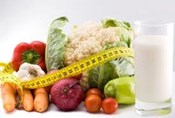Americans put on anywhere from 1 to 5 pounds during the holidays. There are safe and not-so-safe methods of losing those few extra pounds, according to LSU AgCenter nutritionist Dr. Heli Roy.
If you are tempted to try a low-carbohydrate diet, research shows that those diets are not safe. High-meat, low-carbohydrate diets lead to an increased risk of kidney stones, says the LSU AgCenter nutritionist.
In the "American Journal of Kidney Diseases," Dr Chia-Ying Wang said that acid load in the blood increased as much as 90 percent while subjects were on diets that severely restricted carbohydrates. Another compound found in the kidney that inhibits kidney stone formation was reduced by almost 25 percent.
"People may lose a lot of weight quickly on the diet, but this is water loss," Roy says, adding, "Since the diet is very restricted in carbohydrates, any carbohydrates stored in the body are lost in the first day or two, and a lot of water is lost with them."
Roy explains that every gram of carbohydrates stored in the body holds 4 grams of water, so if you lose most of the stored carbohydrates, you will also lose the water with them. Suddenly you will lose weight.
The LSU AgCenter nutritionist says, however, that the body loss is not fat loss and therefore is not permanent. As soon as you eat carbohydrates more liberally, you will hold water and gain weight.
When carbohydrates are restricted, the body goes into ketoacidosis. This condition results from burning too much fat when there aren’t adequate sources of carbohydrates available and when ketones, which are formed when fat is burned for energy, accumulate in the blood.
"Ketones increase blood acidity and can lead to coma if they go too far," Roy says, adding, "Ketoacidosis can occur in diabetes, for example, when there isn’t enough carbohydrate available."
Roy says another harmful effect of restricted carbohydrate diets is that they may increase the risk for osteoporosis. High acid level increases the breakdown of bone and prevents new bone formation - a recipe for osteoporosis.
What are some safe ways to diet? Roy says one of the safest ways to diet is to consume a diet based on MyPlate. It recommends a diet based on whole grains, fruits and vegetables. It is limited in fat and sugars. If you daily consume from 4 ounce equivalents of grains, 1.5 cups of vegetables, 1 cup of fruits and 3 ounces of meat and 2 cups of dairy products, you will consume about 1,200 calories a day. This practice would result in weight loss in most people. Snack on fresh fruit, and limit the consumption of fat for the safest weight loss plan.







